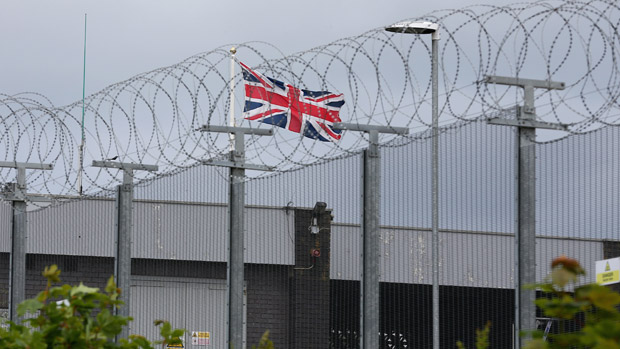Government gears up for battle over surveillance powers
Downing Street faces tough fight after backing away from calls to strip ministers of surveillance powers

A row over surveillance has broken out after a government-commissioned report suggested that ministers should be stripped of their powers to authorise surveillance warrants.
The report, compiled by David Anderson QC, proposes a complete overhaul of Britain's surveillance laws and suggests that only judges be allowed to approve warrants, a move that has been welcomed by privacy campaigners.
Anderson described current legislation as "fragmented, obscure, and variable in the protections that it affords the innocent" and called for a new law to be introduced.
The Week
Escape your echo chamber. Get the facts behind the news, plus analysis from multiple perspectives.

Sign up for The Week's Free Newsletters
From our morning news briefing to a weekly Good News Newsletter, get the best of The Week delivered directly to your inbox.
From our morning news briefing to a weekly Good News Newsletter, get the best of The Week delivered directly to your inbox.
He suggests that a new judicial body, the Independent Surveillance and Intelligence Commission, be set up to take responsibility for authorising warrants from the home and foreign secretaries. Ministers would, however, be able to issue interception warrants in exceptional cases of national security.
If the government chooses to adopt Anderson's proposal, "it would be a substantial sapping of the authority of the home secretary", says The Times. Theresa May personally authorised over 2,000 surveillance warrants last year.
But a Downing Street spokesperson suggested that the government would be wary of changing the law, saying ministers need to be able to "respond quickly and effectively to threats of national security or serious crime".
That means "a battle is looming" in Westminster, says The Guardian. The Prime Minister is likely to face strong opposition from privacy campaigners, the Labour party, as well a number of Conservative rebels if he does not adopt the report's recommendations.
A free daily email with the biggest news stories of the day – and the best features from TheWeek.com
Amnesty International welcomed the report, agreeing that surveillance laws are in need of radical reform. "We'll need to see the fine detail here and we'll be arguing strongly for proper limits on the powers of the snoops and the spooks," the organisation's Rachel Logan told the BBC.
The former Conservative shadow home secretary David Davis is among those who wants to see changes to the law. "It is difficult to understand how the Prime Minister imagines that a system that requires the Home Secretary to approve an average of ten warrants every working day is either effective or expeditious," he said. "I think the government will lose that battle if it chooses to fight."
But Professor Anthony Glees, from the University of Buckingham's Centre for Security and Intelligence Studies was critical of the report. "Judges have a duty to uphold the law, politicians have a very primary duty to deliver national security and in these cases, which are all about national security, it is entirely right that an elected politician should decide."
-
 Villa Treville Positano: a glamorous sanctuary on the Amalfi Coast
Villa Treville Positano: a glamorous sanctuary on the Amalfi CoastThe Week Recommends Franco Zeffirelli’s former private estate is now one of Italy’s most exclusive hotels
-
 How roadkill is a surprising boon to scientific research
How roadkill is a surprising boon to scientific researchUnder the radar We can learn from animals without trapping and capturing them
-
 Why quitting your job is so difficult in Japan
Why quitting your job is so difficult in JapanUnder the Radar Reluctance to change job and rise of ‘proxy quitters’ is a reaction to Japan’s ‘rigid’ labour market – but there are signs of change
-
 The high street: Britain’s next political battleground?
The high street: Britain’s next political battleground?In the Spotlight Mass closure of shops and influx of organised crime are fuelling voter anger, and offer an opening for Reform UK
-
 Is a Reform-Tory pact becoming more likely?
Is a Reform-Tory pact becoming more likely?Today’s Big Question Nigel Farage’s party is ahead in the polls but still falls well short of a Commons majority, while Conservatives are still losing MPs to Reform
-
 Taking the low road: why the SNP is still standing strong
Taking the low road: why the SNP is still standing strongTalking Point Party is on track for a fifth consecutive victory in May’s Holyrood election, despite controversies and plummeting support
-
 What difference will the 'historic' UK-Germany treaty make?
What difference will the 'historic' UK-Germany treaty make?Today's Big Question Europe's two biggest economies sign first treaty since WWII, underscoring 'triangle alliance' with France amid growing Russian threat and US distance
-
 Is the G7 still relevant?
Is the G7 still relevant?Talking Point Donald Trump's early departure cast a shadow over this week's meeting of the world's major democracies
-
 Angela Rayner: Labour's next leader?
Angela Rayner: Labour's next leader?Today's Big Question A leaked memo has sparked speculation that the deputy PM is positioning herself as the left-of-centre alternative to Keir Starmer
-
 Is Starmer's plan to send migrants overseas Rwanda 2.0?
Is Starmer's plan to send migrants overseas Rwanda 2.0?Today's Big Question Failed asylum seekers could be removed to Balkan nations under new government plans
-
 Has Starmer put Britain back on the world stage?
Has Starmer put Britain back on the world stage?Talking Point UK takes leading role in Europe on Ukraine and Starmer praised as credible 'bridge' with the US under Trump